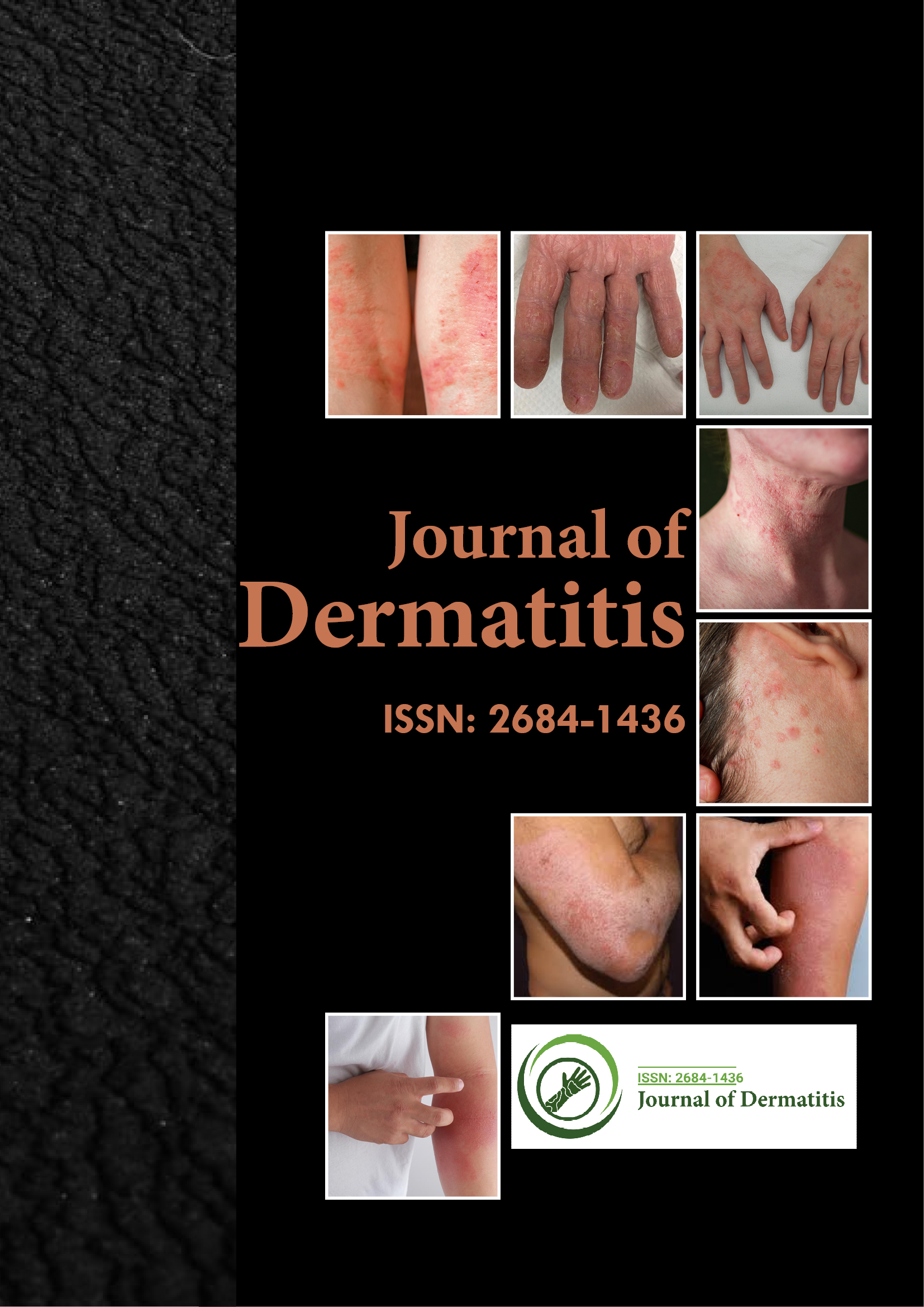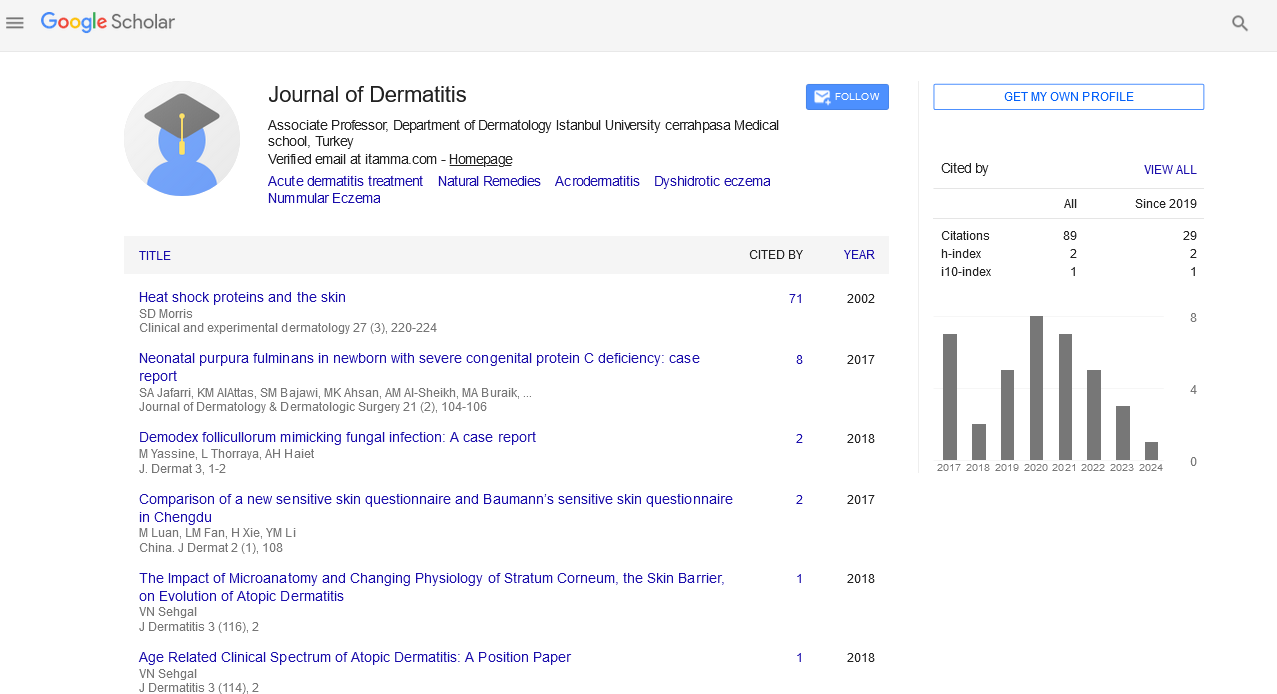Indexed In
- RefSeek
- Hamdard University
- EBSCO A-Z
- Euro Pub
- Google Scholar
Useful Links
Share This Page
Journal Flyer

Open Access Journals
- Agri and Aquaculture
- Biochemistry
- Bioinformatics & Systems Biology
- Business & Management
- Chemistry
- Clinical Sciences
- Engineering
- Food & Nutrition
- General Science
- Genetics & Molecular Biology
- Immunology & Microbiology
- Medical Sciences
- Neuroscience & Psychology
- Nursing & Health Care
- Pharmaceutical Sciences
Commentary - (2023) Volume 8, Issue 6
The Immune System's Role in Psoriasis Pathogenesis and Its Regulation
Baligi Azizr*Received: 17-Oct-2023, Manuscript No. JOD-23-23937; Editor assigned: 20-Oct-2023, Pre QC No. JOD-23-23937 (PQ); Reviewed: 03-Nov-2023, QC No. JOD-23-23937; Revised: 10-Nov-2023, Manuscript No. JOD-23-23937 (R); Published: 17-Nov-2023, DOI: 10.35248/2684-1436.23.8.222
Description
Psoriasis is a chronic autoimmune disease that affects millions of people, causing red, scaly patches on the skin. It is a multifaceted condition with a complex pathogenesis, in which the immune system plays a central role. Understanding the immune system's involvement in psoriasis pathogenesis and its regulation is vital for developing effective treatments and improving the quality of life for those affected by this condition [1-3].
Psoriasis pathogenesis
The pathogenesis of psoriasis is a result of both genetic predisposition and environmental triggers. It is now accepted that an abnormal immune response, primarily driven by T cells, plays a pivotal role. In a healthy individual, the immune system detects and combats infections, injuries, and other threats. However, in psoriasis, the immune system becomes dysregulated, leading to a misguided response [4].
One key element in psoriasis pathogenesis is the activation of T cells, particularly T helper 17 (Th17) cells. These cells produce pro-inflammatory cytokines like interleukin-17 (IL-17) and interleukin-23 (IL-23). Overproduction of these cytokines leads to an inflammatory cascade, ultimately causing the characteristic symptoms of psoriasis, including skin cell overgrowth, inflammation, and plaque formation [5].
Immune system regulation in psoriasis
The regulation of the immune system in psoriasis is a topic of extensive research and clinical investigation. Various strategies and therapies aim to control the immune response and alleviate the symptoms. Here are some key approaches:
Biologics: Biologic therapies target specific components of the immune system involved in psoriasis. These medications, such as TNF-alpha inhibitors, IL-17 inhibitors, and IL-23 inhibitors, have shown remarkable success in reducing inflammation and improving skin symptoms. They work by blocking the actions of cytokines and immune cells responsible for psoriasis pathogenesis.
Topical and systemic treatments: Topical treatments, such as corticosteroids and calcineurin inhibitors, help to reduce inflammation and slow down skin cell growth. Systemic treatments, including methotrexate and cyclosporine, suppress the immune system more broadly and are often used for severe cases of psoriasis [6].
Phototherapy: Ultraviolet (UV) light therapy, often delivered as narrowband ultraviolet B or Psoralen Plus Ultraviolet-A Radiation (PUVA) therapy, can help regulate the immune response in the skin and improve psoriatic symptoms. UV light has immunomodulatory effects and can reduce inflammation and skin cell proliferation [7].
Lifestyle and dietary changes: Some individuals find relief from psoriasis symptoms by making dietary and lifestyle adjustments. This includes managing stress, maintaining a healthy weight, and avoiding triggers like alcohol and smoking. Dietary changes, such as increasing omega-3 fatty acids and reducing foods that promote inflammation, may also be beneficial [8].
Patient education and support: Patients living with psoriasis can benefit from education and support to manage their condition effectively. Understanding the triggers and learning how to reduce stress can help in managing symptoms. Additionally, connecting with support groups and healthcare professionals can offer emotional and practical assistance [9,10].
In conclusion, the immune system's role in psoriasis pathogenesis is undeniable, and advancements in our understanding of this connection have led to significant improvements in the treatment of the disease. While there is no cure for psoriasis, various therapeutic options are available to regulate the immune system and manage the symptoms. Research in immunology continues to shed light on this complex condition, offering hope for more effective and personalized treatments in the future. Patients and healthcare providers should work together to find the most suitable treatment plan, taking into account the individual's unique needs and circumstances. With ongoing research and a multifaceted approach, we can look forward to better management and, eventually, more effective treatments for psoriasis.
References
- Song MJ, Yun DH, Hong SI. An electrochemical biosensor array for rapid detection of alanine aminotransferase and aspartate aminotransferase. Biosci Biotechnol Biochem. 2009;73(3):474-478.
[Crossref] [Google Scholar] [PubMed]
- Khampha W, Yakovleva J, Isarangkul D, Wiyakrutta S, Meevootisom V, Emnéus J. Specific detection of L-glutamate in food using flow-injection analysis and enzymatic recycling of substrate. Analytica chimica acta. 2004;518(1-2):127-135.
- Wang Z, Zhu G, Wang Y, Li M, Singh R, Zhang B, et al. Fabrication techniques and stability analysis of SMF-/MMF-based differently tapered optical fiber structures. Applied Optics. 2021; 60(7):2077-2082.
[Crossref] [Google Scholar] [PubMed]
- Wang Z, Singh R, Marques C, Jha R, Zhang B, Kumar S. Taper-in-taper fiber structure-based LSPR sensor for alanine aminotransferase detection. Optics Express. 2021; 29(26):43793-43810.
- Wang Y, Zhu G, Li M, Singh R, Marques C, Min R, et al. Water pollutants p-cresol detection based on Au-ZnO nanoparticles modified tapered optical fiber. IEEE Trans Nanobioscience. 2021; 20(3):377-84.
[Crossref] [Google Scholar] [PubMed]
- Wu L, Chu HS, Koh WS, Li EP. Highly sensitive graphene biosensors based on surface plasmon resonance. Opt Express. 2010; 18(14):14395-14400.
[Crossref] [Google Scholar] [PubMed]
- Xing F, Meng GX, Zhang Q, Pan LT, Wang P, Liu ZB, et al. Ultrasensitive flow sensing of a single cell using graphene-based optical sensors. Nano Lett. 2014; 14(6):3563-3569.
[Crossref] [Google Scholar] [PubMed]
- Zeng S, Baillargeat D, Ho HP, Yong KT. Nanomaterials enhanced surface plasmon resonance for biological and chemical sensing applications. Chemical Society Reviews. 2014;43(10):3426-352.
[Crossref] [Google Scholar] [PubMed]
- Zeng S, Hu S, Xia J, Anderson T, Dinh XQ, Meng XM, et al. Graphene–MoS2 hybrid nanostructures enhanced surface plasmon resonance biosensors. Sensors and Actuators B: Chemical. 2015; 207:801-810.
- Xi S, Zhang X, Du Z, Li L, Wang B, Luan Z, et al. Laser Raman detection of authigenic carbonates from cold seeps at the Formosa Ridge and east of the Pear River Mouth Basin in the South China Sea. Journal of Asian Earth Sciences. 2018; 168:207-224.
Citation: Azizr B (2023) Immune System's Role in Psoriasis Pathogenesis and Its Regulation. J Dermatitis. 8:222.
Copyright: © 2023 Azizr B. This is an open-access article distributed under the terms of the Creative Commons Attribution License, which permits unrestricted use, distribution, and reproduction in any medium, provided the original author and source are credited.

